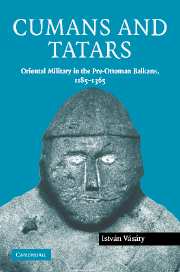Book contents
- Frontmatter
- Contents
- Preface
- 1 Introduction
- 2 Cumans and the Second Bulgarian Empire
- 3 Cumans in the Balkans before the Tatar conquest, 1241
- 4 The first period of Tatar influence in the Balkans, 1242–1282
- 5 The heyday of Tatar influence in the Balkans, 1280–1301
- 6 Cumans and Tatars on the Serbian scene
- 7 Cumans in Byzantine service after the Tatar conquest, 1242–1333
- 8 The Tatars fade away from Bulgaria and Byzantium, 1320–1354
- 9 The emergence of two Romanian principalities in Cumania, 1330, 1364
- Conclusion
- Appendix 1 List of geographical names
- Appendix 2 Chronological table of dynasties
- Appendix 3 Maps
- List of abbreviations
- Bibliography
- Index
- References
Bibliography
Published online by Cambridge University Press: 29 July 2009
- Frontmatter
- Contents
- Preface
- 1 Introduction
- 2 Cumans and the Second Bulgarian Empire
- 3 Cumans in the Balkans before the Tatar conquest, 1241
- 4 The first period of Tatar influence in the Balkans, 1242–1282
- 5 The heyday of Tatar influence in the Balkans, 1280–1301
- 6 Cumans and Tatars on the Serbian scene
- 7 Cumans in Byzantine service after the Tatar conquest, 1242–1333
- 8 The Tatars fade away from Bulgaria and Byzantium, 1320–1354
- 9 The emergence of two Romanian principalities in Cumania, 1330, 1364
- Conclusion
- Appendix 1 List of geographical names
- Appendix 2 Chronological table of dynasties
- Appendix 3 Maps
- List of abbreviations
- Bibliography
- Index
- References
- Type
- Chapter
- Information
- Cumans and TatarsOriental Military in the Pre-Ottoman Balkans, 1185–1365, pp. 197 - 216Publisher: Cambridge University PressPrint publication year: 2005



